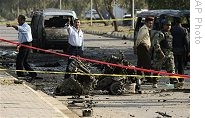voa标准英语2008-Explosions Rock Baghdad and Mosul
搜索关注在线英语听力室公众号:tingroom,领取免费英语资料大礼包。
(单词翻译)
Terrorists stepped up their attacks inside Iraq Monday, setting off explosions in Baghdad and Mosul that killed at least 33 people. Edward Yeranian has more on the latest violence in this report from Cairo. |
| Iraqi security personnel secure the site of a twin bombing near the entrance to a police academy in Baghdad, Iraq, 01 Dec 2008 |
Terrorists are redoubling their efforts to shake a fragile calm, which has prevailed in Iraq in recent weeks, with multiple explosions aimed at Iraqi police and military targets. In the worst incident, two back-to-back explosions targeted Iraq's police academy.
Police sources say that both a car-bomb and a suicide attacker blew up in quick succession. Many of those killed and wounded were police officers and recruits standing1 near the entrance of the academy on Palestine Street. Until recently the area had been closed to traffic in response to a bloody2 suicide-bombing targeting the academy, two years ago.
Meanwhile, in the turbulent northern city of Mosul, a suicide car-bomber blew himself up alongside a joint3 US-Iraqi patrol.
Most of the victims were civilians4, but several Iraqi policemen were among the casualties.
Earlier, a roadside bombing wounded Major-General Mudhar al-Malwah, a senior defense5 ministry6 official, killing7 a number of his bodyguards8, according to Al Arabiya TV.
Just after the bombing, US army Captain Errol Davis indicated that five Iraqi civilians were also wounded in the incident:
"The General was wounded and five local national innocent people were wounded as well, and one individual unfortunately was killed," said Davis.
The bombing appears to be symbolic9, because al-Malwa was reportedly involved in trying to persuade former Iraqi officers from Saddam Hussein's regime to lay down their arms and end their insurgency10 against the current Iraqi government.
Defense Ministry officials say that General al-Malwa was also involved with Sunni "Awakening11" groups called the "Sons of Iraq", which have joined forces with the U.S. forces to combat al Qaida.
Violence across Iraq has decreased dramatically since the Sunni "Awakening" groups took up arms against al Qaida.
Some analysts12 have speculated that the upsurge in attacks in Iraq is a response to the recent parliamentary approval of the controversial U.S. Iraq security pact13, which was bitterly opposed by supporters of Shiite cleric Moqtada al Sadr.
Joost Hiltermann, Deputy Middle East Program Director of the International Crisis Group thinks, however, that the violence is probably more of an ongoing14 phenomenon, than a reaction to the new U.S. security pact.
"I would not necessarily link it to the accord, I think we have seen a general slight degree, a slight increase rather in violence in Baghdad and of course in Mosul we have had violence throughout and it hasn't really changed much," said Hiltermann. "So, I think in the run up to (January) provincial15 elections we will see more of that. The situation is still very fragile, military control of Baghdad and Mosul and other areas is still very tenuous16. So, it is very difficult to prevent these attacks from taking place. There is still plenty of spoilers throughout especially al-Qaida, especially some insurgents17 who never went away and again in mixed population areas like Mosul and Baghdad they have more motive18 and more permissive terrain19 to operate. So, I would suspect that you won't see a decrease of violence, but you may not see a major increase either."
The month of November did see a spike20 in violence, according to a fresh Iraqi government report, which indicates that 340 Iraqis were killed across the country last month.
 收听单词发音
收听单词发音 




